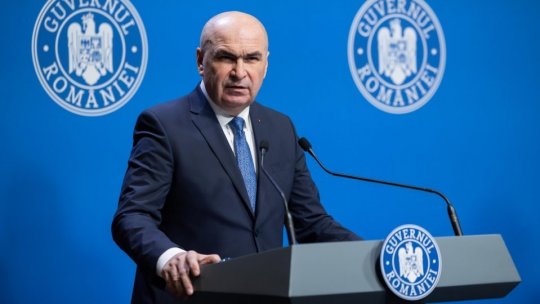Financial Press Review, 10 May
Articles from the dailies Ziarul Financiar, Curierul Naţional, Bursa and Economistul.

Articol de Dinu Dragomirescu, 10 Mai 2011, 19:05
The conclusions of the first review on the new agreement with the International Monetary Fund and the need for rejecting the political appointments were the dominant topics in today’s financial news.
The Curierul Naţional opend with an article entitled ‘Will any fee be cut down soon?’
First it has to be shown that a cut down on the social security contributions can be possible, which was announced on several occasions as being part of premiere Boc’s plans for the mid-year.
‘President Traian Băsescu said on Saturday that he did not think it possible to cut down social security contributions during 2011, pleading reasons related to employment in the deficit targets’, the newspaper wrote, adding:‘As for the decrease of the VAT and the flat tax, the Fund said that we would have to wait at least 5 or 10 years (...) The fiscal success of Romania in the next period will depend on the promised raises of the salaries in the public sector, so that they salaries get closer to their level previous to the 25 percent reduction in June 2010’, the Curierul Naţional revealed.
‘The goal for next year’s budget deficit of 3 percent of the GDP will be a challenge given that the losses of state companies are also included’, the Ziarul Financiar wrote.
‘The total arrears of the public sector represent 4-5 percent of the gross domestic product, the daily Bursa quoted Jeffrey Franks, the head of the IMF mission to Romania.
‘Now that Franks has oriented his speech toward the state companies with losses, he made a common cause with President Traian Băsescu, who on Saturday criticized the barons of the local state companies.’
‘But these managers are politically appointed by the ministries’, the Ziarul Financiar recalled. ‘Jeffrey Franks asked for private management in case of the state companies as a solution to cut down the losses and arrears,’ the newspaper noted.
But ‘for a private manager to be successful in leading a state company, he must be allowed to make decisions without being constrained by political influences, to receive a salary at the level of a multinational manager, to have defined goals and to receive a career bonus at the end of the mandate,’ in case he fulfilled his goals, the Ziarul Financiar revealed in another article.
‘If they first search for the occupant, without setting any goals, then they started on the wrong foot, because achieving each goal requires a different type of manager.’
The Ziarul Financiar opened its front page with an article entitled ‘National Bank of Romania rejects two vice-presidents with no banking experience, proposed by the Liberal Democratic Party for CEC Bank’.
‘Politicians have consistently attempted to be permeated in one form or another, in leading the largest state-owned banks, but at least in this matter the tradition of changes was broken each time a different party came to government’, the newspaper wrote.
‘The politicization of CEC Bank took extreme proportions in the late ‘90s, when the then leadership affiliated to the Christian-Democratic National Peasants’ Party led the bank in an association with the former National Investment Fund, thus involving it in the scandal of the most resounding failure of a mutual fund.’
The weekly Economistul published an interview with Cezar Mereuţă, President of the Romanian Centre for Economic Modeling, in which it is approached, among others, the issue of the Romanian exports vulnerabilities.
‘The most important of them is the degree of concentration, while 100 companies cover half of Romania’s exports.’
Another matter requiring concentration is the number of people conducting all the export operations of the total companies.
‘Of over 400 000 active companies, only 30,000 make exports.’
However, ‘for more than a decade, the business environment demanded the Parliament the Holding Company Act, which would focus on the domestic capital in order to considerably increase its negotiating skins on foreign markets.
Only by this way can major brands step forward.
Some of the past have been lost’, Cezar Mereuţă pointed out in the Economistul.
Translated by: Iulia Florescu
MA Student, MTTLC, Bucharest University













